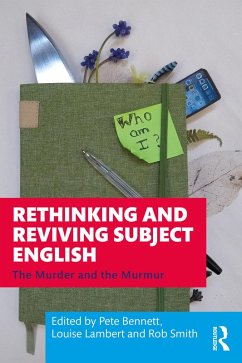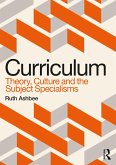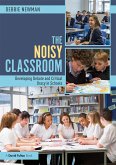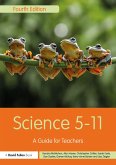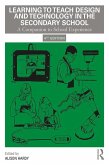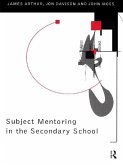Rethinking and Reviving Subject English (eBook, ePUB)
The Murder and the Murmur
Redaktion: Bennett, Pete; Smith, Rob; Lambert, Louise
37,95 €
37,95 €
inkl. MwSt.
Sofort per Download lieferbar

19 °P sammeln
37,95 €
Als Download kaufen

37,95 €
inkl. MwSt.
Sofort per Download lieferbar

19 °P sammeln
Jetzt verschenken
Alle Infos zum eBook verschenken
37,95 €
inkl. MwSt.
Sofort per Download lieferbar
Alle Infos zum eBook verschenken

19 °P sammeln
Rethinking and Reviving Subject English (eBook, ePUB)
The Murder and the Murmur
Redaktion: Bennett, Pete; Smith, Rob; Lambert, Louise
- Format: ePub
- Merkliste
- Auf die Merkliste
- Bewerten Bewerten
- Teilen
- Produkt teilen
- Produkterinnerung
- Produkterinnerung

Bitte loggen Sie sich zunächst in Ihr Kundenkonto ein oder registrieren Sie sich bei
bücher.de, um das eBook-Abo tolino select nutzen zu können.
Hier können Sie sich einloggen
Hier können Sie sich einloggen
Sie sind bereits eingeloggt. Klicken Sie auf 2. tolino select Abo, um fortzufahren.

Bitte loggen Sie sich zunächst in Ihr Kundenkonto ein oder registrieren Sie sich bei bücher.de, um das eBook-Abo tolino select nutzen zu können.
This book invites readers to engage with the rich and complex debates of contemporary English education, outlining new possibilities to revive the teaching of English.
- Geräte: eReader
- ohne Kopierschutz
- eBook Hilfe
- Größe: 2.91MB
Andere Kunden interessierten sich auch für
![Curriculum: Theory, Culture and the Subject Specialisms (eBook, ePUB) Curriculum: Theory, Culture and the Subject Specialisms (eBook, ePUB)]() Ruth AshbeeCurriculum: Theory, Culture and the Subject Specialisms (eBook, ePUB)17,95 €
Ruth AshbeeCurriculum: Theory, Culture and the Subject Specialisms (eBook, ePUB)17,95 €![The Noisy Classroom (eBook, ePUB) The Noisy Classroom (eBook, ePUB)]() Debbie NewmanThe Noisy Classroom (eBook, ePUB)20,95 €
Debbie NewmanThe Noisy Classroom (eBook, ePUB)20,95 €![Science 5-11 (eBook, ePUB) Science 5-11 (eBook, ePUB)]() Kendra McMahonScience 5-11 (eBook, ePUB)28,95 €
Kendra McMahonScience 5-11 (eBook, ePUB)28,95 €![Learning to Teach Design and Technology in the Secondary School (eBook, ePUB) Learning to Teach Design and Technology in the Secondary School (eBook, ePUB)]() Learning to Teach Design and Technology in the Secondary School (eBook, ePUB)31,95 €
Learning to Teach Design and Technology in the Secondary School (eBook, ePUB)31,95 €![Authority, Passion, and Subject-Centered Teaching (eBook, ePUB) Authority, Passion, and Subject-Centered Teaching (eBook, ePUB)]() Christopher J. RichmannAuthority, Passion, and Subject-Centered Teaching (eBook, ePUB)41,95 €
Christopher J. RichmannAuthority, Passion, and Subject-Centered Teaching (eBook, ePUB)41,95 €![Subject Mentoring in the Secondary School (eBook, ePUB) Subject Mentoring in the Secondary School (eBook, ePUB)]() James ArthurSubject Mentoring in the Secondary School (eBook, ePUB)41,95 €
James ArthurSubject Mentoring in the Secondary School (eBook, ePUB)41,95 €![The Teaching of Science in Primary Schools (eBook, ePUB) The Teaching of Science in Primary Schools (eBook, ePUB)]() Wynne Harlen ObeThe Teaching of Science in Primary Schools (eBook, ePUB)36,95 €
Wynne Harlen ObeThe Teaching of Science in Primary Schools (eBook, ePUB)36,95 €-
-
-
This book invites readers to engage with the rich and complex debates of contemporary English education, outlining new possibilities to revive the teaching of English.
Dieser Download kann aus rechtlichen Gründen nur mit Rechnungsadresse in A, B, BG, CY, CZ, D, DK, EW, E, FIN, F, GR, HR, H, IRL, I, LT, L, LR, M, NL, PL, P, R, S, SLO, SK ausgeliefert werden.
Produktdetails
- Produktdetails
- Verlag: Taylor & Francis eBooks
- Seitenzahl: 254
- Erscheinungstermin: 27. September 2022
- Englisch
- ISBN-13: 9781000655421
- Artikelnr.: 65448809
- Verlag: Taylor & Francis eBooks
- Seitenzahl: 254
- Erscheinungstermin: 27. September 2022
- Englisch
- ISBN-13: 9781000655421
- Artikelnr.: 65448809
- Herstellerkennzeichnung Die Herstellerinformationen sind derzeit nicht verfügbar.
Dr Pete Bennett is a Senior Lecturer in Post Compulsory Education at the University of Wolverhampton, UK. Dr Louise Lambert is an Associate Professor in the School of Education and Social work at Birmingham City University, UK. Dr Rob Smith is a Professor of Education at Birmingham City University, UK.
Introduction: Rethinking and Reviving Subject English: The Murder and the
Murmur. Part 1. The murder: Politics, policy and practice. 1. English is
shit! A post-modern murder mystery. Kirstie Harrington. 2. Where has oracy
gone? The curious case of the erosion of speaking and listening in GCSE
English. Nic Worgan & Georgina Garbett. 3. Is the English curriculum really
suitable for all? Salya Akhtar. 4. Rethinking, reimagining English in the
post-16 sector: COVID-19 and the future of English. Joanne Bowser-Angermann
& Elizabeth Draper. 5. Against the clock: 'Time for Literacy Hour,
children' - A critique of English policy in primary schools. Louise
Wheatcroft. 6. "A little bit of Jekyll, a little Mr. Hyde": Secondary
English teachers speak of the tensions between their perception of English
teaching and the systems they are required to serve. Debbie Haynes. Part 2.
Notes from the struggle: Engagement and re-openings. 7. Zainab. Heather
James. 8. 'Smallness, narrowness and servility': Resisting English at
university over 30 years. Michael Jopling and Harvey Jopling. 9. Home
education and English: The ticking time bomb of future need? Mel Carter.
10. Making creative spaces - constraints and aspirations: The English
curriculum From Key Stage One to Key Stage Three. Steph Perks, Jennifer
Wells and Victoria Wright. 11. Old books for hungry children: Negotiating
definitions of cultural capital to support 'disadvantaged' children in
primary school reading. Shaun Allen-Dooley. 12. In your own write; for
English wherever I may find her: De-territorialising writing. Pete Bennett
and Howard Scott. Part 3. The murmur: Optimism, re-imaginings and ways to
rethink English. 13. The tentative: A modest proposal for a great leap
forward. Shaun Passey . 14. Possibilities for teaching English literature
in posthuman times. Louise Lambert. 15. Dissenting voices: Finding agency,
authenticity and autonomy in the 'luxuriant now'. Chris Waugh. 16. English
and the Lefebvrian 'moment'. Rob Smith. 17. Interrogating the listening
practices of Mr Oxford Don: teacher education, culturally sustaining
pedagogies and raciolinguistic ideologies. Ian Cushing. Afterword:
Resources of Hope. Pete Bennett, Louise Lambert and Rob Smith
Murmur. Part 1. The murder: Politics, policy and practice. 1. English is
shit! A post-modern murder mystery. Kirstie Harrington. 2. Where has oracy
gone? The curious case of the erosion of speaking and listening in GCSE
English. Nic Worgan & Georgina Garbett. 3. Is the English curriculum really
suitable for all? Salya Akhtar. 4. Rethinking, reimagining English in the
post-16 sector: COVID-19 and the future of English. Joanne Bowser-Angermann
& Elizabeth Draper. 5. Against the clock: 'Time for Literacy Hour,
children' - A critique of English policy in primary schools. Louise
Wheatcroft. 6. "A little bit of Jekyll, a little Mr. Hyde": Secondary
English teachers speak of the tensions between their perception of English
teaching and the systems they are required to serve. Debbie Haynes. Part 2.
Notes from the struggle: Engagement and re-openings. 7. Zainab. Heather
James. 8. 'Smallness, narrowness and servility': Resisting English at
university over 30 years. Michael Jopling and Harvey Jopling. 9. Home
education and English: The ticking time bomb of future need? Mel Carter.
10. Making creative spaces - constraints and aspirations: The English
curriculum From Key Stage One to Key Stage Three. Steph Perks, Jennifer
Wells and Victoria Wright. 11. Old books for hungry children: Negotiating
definitions of cultural capital to support 'disadvantaged' children in
primary school reading. Shaun Allen-Dooley. 12. In your own write; for
English wherever I may find her: De-territorialising writing. Pete Bennett
and Howard Scott. Part 3. The murmur: Optimism, re-imaginings and ways to
rethink English. 13. The tentative: A modest proposal for a great leap
forward. Shaun Passey . 14. Possibilities for teaching English literature
in posthuman times. Louise Lambert. 15. Dissenting voices: Finding agency,
authenticity and autonomy in the 'luxuriant now'. Chris Waugh. 16. English
and the Lefebvrian 'moment'. Rob Smith. 17. Interrogating the listening
practices of Mr Oxford Don: teacher education, culturally sustaining
pedagogies and raciolinguistic ideologies. Ian Cushing. Afterword:
Resources of Hope. Pete Bennett, Louise Lambert and Rob Smith
Introduction: Rethinking and Reviving Subject English: The Murder and the
Murmur. Part 1. The murder: Politics, policy and practice. 1. English is
shit! A post-modern murder mystery. Kirstie Harrington. 2. Where has oracy
gone? The curious case of the erosion of speaking and listening in GCSE
English. Nic Worgan & Georgina Garbett. 3. Is the English curriculum really
suitable for all? Salya Akhtar. 4. Rethinking, reimagining English in the
post-16 sector: COVID-19 and the future of English. Joanne Bowser-Angermann
& Elizabeth Draper. 5. Against the clock: 'Time for Literacy Hour,
children' - A critique of English policy in primary schools. Louise
Wheatcroft. 6. "A little bit of Jekyll, a little Mr. Hyde": Secondary
English teachers speak of the tensions between their perception of English
teaching and the systems they are required to serve. Debbie Haynes. Part 2.
Notes from the struggle: Engagement and re-openings. 7. Zainab. Heather
James. 8. 'Smallness, narrowness and servility': Resisting English at
university over 30 years. Michael Jopling and Harvey Jopling. 9. Home
education and English: The ticking time bomb of future need? Mel Carter.
10. Making creative spaces - constraints and aspirations: The English
curriculum From Key Stage One to Key Stage Three. Steph Perks, Jennifer
Wells and Victoria Wright. 11. Old books for hungry children: Negotiating
definitions of cultural capital to support 'disadvantaged' children in
primary school reading. Shaun Allen-Dooley. 12. In your own write; for
English wherever I may find her: De-territorialising writing. Pete Bennett
and Howard Scott. Part 3. The murmur: Optimism, re-imaginings and ways to
rethink English. 13. The tentative: A modest proposal for a great leap
forward. Shaun Passey . 14. Possibilities for teaching English literature
in posthuman times. Louise Lambert. 15. Dissenting voices: Finding agency,
authenticity and autonomy in the 'luxuriant now'. Chris Waugh. 16. English
and the Lefebvrian 'moment'. Rob Smith. 17. Interrogating the listening
practices of Mr Oxford Don: teacher education, culturally sustaining
pedagogies and raciolinguistic ideologies. Ian Cushing. Afterword:
Resources of Hope. Pete Bennett, Louise Lambert and Rob Smith
Murmur. Part 1. The murder: Politics, policy and practice. 1. English is
shit! A post-modern murder mystery. Kirstie Harrington. 2. Where has oracy
gone? The curious case of the erosion of speaking and listening in GCSE
English. Nic Worgan & Georgina Garbett. 3. Is the English curriculum really
suitable for all? Salya Akhtar. 4. Rethinking, reimagining English in the
post-16 sector: COVID-19 and the future of English. Joanne Bowser-Angermann
& Elizabeth Draper. 5. Against the clock: 'Time for Literacy Hour,
children' - A critique of English policy in primary schools. Louise
Wheatcroft. 6. "A little bit of Jekyll, a little Mr. Hyde": Secondary
English teachers speak of the tensions between their perception of English
teaching and the systems they are required to serve. Debbie Haynes. Part 2.
Notes from the struggle: Engagement and re-openings. 7. Zainab. Heather
James. 8. 'Smallness, narrowness and servility': Resisting English at
university over 30 years. Michael Jopling and Harvey Jopling. 9. Home
education and English: The ticking time bomb of future need? Mel Carter.
10. Making creative spaces - constraints and aspirations: The English
curriculum From Key Stage One to Key Stage Three. Steph Perks, Jennifer
Wells and Victoria Wright. 11. Old books for hungry children: Negotiating
definitions of cultural capital to support 'disadvantaged' children in
primary school reading. Shaun Allen-Dooley. 12. In your own write; for
English wherever I may find her: De-territorialising writing. Pete Bennett
and Howard Scott. Part 3. The murmur: Optimism, re-imaginings and ways to
rethink English. 13. The tentative: A modest proposal for a great leap
forward. Shaun Passey . 14. Possibilities for teaching English literature
in posthuman times. Louise Lambert. 15. Dissenting voices: Finding agency,
authenticity and autonomy in the 'luxuriant now'. Chris Waugh. 16. English
and the Lefebvrian 'moment'. Rob Smith. 17. Interrogating the listening
practices of Mr Oxford Don: teacher education, culturally sustaining
pedagogies and raciolinguistic ideologies. Ian Cushing. Afterword:
Resources of Hope. Pete Bennett, Louise Lambert and Rob Smith
